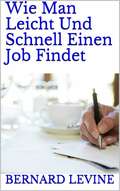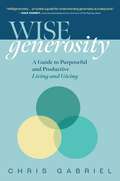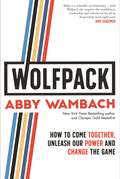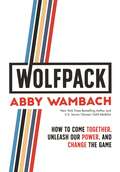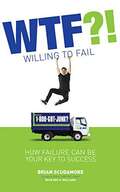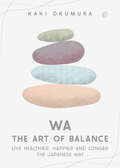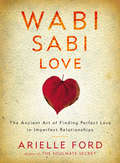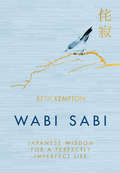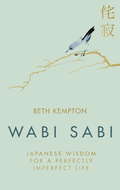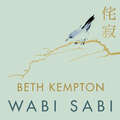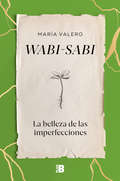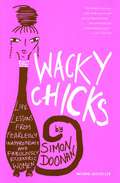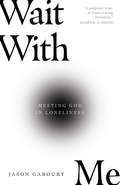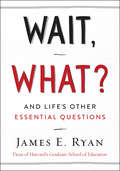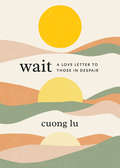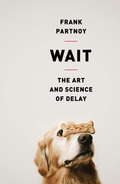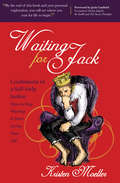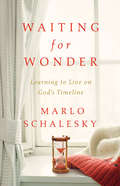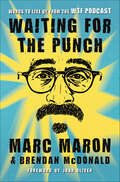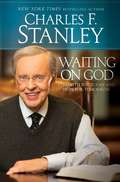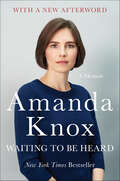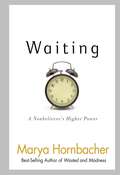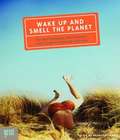- Table View
- List View
WIE MAN LEICHT UND SCHNELL EINEN JOB FINDET
by Bernard Levine M. PfeifferWenn du keine Antwort auf deine Job-Bewerbungen erhälst ... Wenn du frustriert bist wieder und wieder abgelehnt zu werden... Dann wird dieses Buch das Wunder in deinem Leben sein. Lass mich dir helfen und dir einen viel besseren Weg zeigen einen Job zu finden. Wir werden nicht machen, was alle anderen machen um einen Job zu bekommen. Wir werden uns auf einen anderen Weg begeben um einen Job für dich zu finden. Wenn du den Geheimnissen in diesem Buch folgst, wirst du Erfolg haben und schnell und leicht einen Job finden.
WISEgenerosity: A Guide for Purposeful and Practical Living and Giving
by Christopher GabrielThe question was, &“What am I supposed to do in life?&” The answer: &“Be generous.&”Think about the most successful people you know—those with wealth, power, and status. Are they happy? Are they enlightened? Are they fulfilled? Maybe . . . and maybe not. Sometimes, the glitz of a social media façade hides a lonely, unfilled, and unrewarding life. Chances are, the happiest, most grateful, and most graceful people you know are the ones who have prioritized more than simple &“success.&” Instead, these are the women and men who have chosen a different path—an others-first perspective that prioritizes giving over self-gratification and self-promotion. And not just generosity—WISEgenerosity. In this landmark work, Chris Gabriel presents the guidebook on generosity for the modern age. Forgoing outdated and superficial assumptions about vague, undirected, merely &“feel-good&” giving, Chris brings laser focus to generosity that is W.I.S.E.: Well-grounded Inspired Satisfying Effective Filled with practical instruction, uplifting stories, challenging self-examination exercises, and detailed models, WISEgenerosity cuts through the confusion surrounding why to give, how to give, what to give, when to give, and where to give. Then, it takes you by the hand and walks you down a thoughtful, proven path to a purposeful and productive life—your best life—with generosity that is meaningful and effective for both the giver and the receiver. This is WISEgenerosity.
WOLFPACK: How to Come Together, Unleash Our Power and Change the Game
by Abby WambachTHE NEW YORK TIMES BESTSELLER Based on her inspiring, viral 2018 commencement speech to Barnard College's graduates in New York City, New York Times bestselling author, two-time Olympic gold medallist and FIFA World Cup champion Abby Wambach delivers her empowering rally cry for women to unleash their individual power, unite with their pack, and emerge victorious together.Abby Wambach became a champion because of her incredible talent as a football player. She became an icon because of her remarkable wisdom as a leader. As the co-captain of the 2015 Women's World Cup Champion Team, she created a culture not just of excellence, but of honour, commitment, resilience, and sisterhood. She helped transform a group of individual women into one of the most successful, powerful and united Wolfpacks of all time.In her retirement, Abby's ready to do the same for her new team: All Women Everywhere.She insists that women must let go of old rules of leadership that neither include or serve them. She's created a new set of Wolfpack rules to help women unleash their individual power, unite with their Wolfpack, and change the landscape of their lives and world.· Make failure your fuel: Transform failure to wisdom and power. · Lead from the bench: Lead from wherever you are. · Champion each other: Claim each woman's victory as your own. · Demand the effing ball: Don't ask permission: take what you've earned.In Abby's vision, we are not Little Red Riding Hoods, staying on the path because we're told to. We are the wolves, fighting for a better tomorrow for ourselves, our pack, and all the future wolves who will come after us.
WOLFPACK: How to Come Together, Unleash Our Power and Change the Game
by Abby WambachTHE NEW YORK TIMES BESTSELLER Based on her inspiring, viral 2018 commencement speech to Barnard College's graduates in New York City, New York Times bestselling author, two-time Olympic gold medallist and FIFA World Cup champion Abby Wambach delivers her empowering rally cry for women to unleash their individual power, unite with their pack, and emerge victorious together.Abby Wambach became a champion because of her incredible talent as a football player. She became an icon because of her remarkable wisdom as a leader. As the co-captain of the 2015 Women's World Cup Champion Team, she created a culture not just of excellence, but of honour, commitment, resilience, and sisterhood. She helped transform a group of individual women into one of the most successful, powerful and united Wolfpacks of all time.In her retirement, Abby's ready to do the same for her new team: All Women Everywhere.She insists that women must let go of old rules of leadership that neither include or serve them. She's created a new set of Wolfpack rules to help women unleash their individual power, unite with their Wolfpack, and change the landscape of their lives and world.· Make failure your fuel: Transform failure to wisdom and power. · Lead from the bench: Lead from wherever you are. · Champion each other: Claim each woman's victory as your own. · Demand the effing ball: Don't ask permission: take what you've earned.In Abby's vision, we are not Little Red Riding Hoods, staying on the path because we're told to. We are the wolves, fighting for a better tomorrow for ourselves, our pack, and all the future wolves who will come after us.
WOLFPACK: How to Come Together, Unleash Our Power, and Change the Game
by Abby WambachBased on her inspiring, viral 2018 commencement speech to Barnard College’s graduates in New York City, New York Times bestselling author, two-time Olympic gold medalist and FIFA World Cup champion Abby Wambach delivers her empowering rally cry for women to unleash their individual power, unite with their pack, and emerge victorious together.Abby Wambach became a champion because of her incredible talent as a soccer player. She became an icon because of her remarkable wisdom as a leader. As the co-captain of the 2015 Women’s World Cup Champion Team, she created a culture not just of excellence, but of honor, commitment, resilience, and sisterhood. She helped transform a group of individual women into one of the most successful, powerful and united Wolfpacks of all time. In her retirement, Abby’s ready to do the same for her new team: All Women Everywhere. In Wolfpack, Abby’s message to women is: We have never been Little Red Riding Hood. We Are the Wolves. <P><P>We must wander off the path and blaze a new one: together. <P><P>She insists that women must let go of old rules of leadership that neither include or serve them. She’s created a new set of Wolfpack rules to help women unleash their individual power, unite with their Wolfpack, and change the landscape of their lives and world: from the family room to the board room to the White House. · Make failure your fuel: Transform failure to wisdom and power. · Lead from the bench: Lead from wherever you are. · Champion each other: Claim each woman’s victory as your own. · Demand the effing ball: Don’t ask permission: take what you’ve earned. <P><P>In Abby’s vision, we are not Little Red Riding Hoods, staying on the path because we’re told to. We are the wolves, fighting for a better tomorrow for ourselves, our pack, and all the future wolves who will come after us. <P><P><b>A New York Times Bestseller</b>
WRAP Plus (Wellness Recovery Action Plan)
by Mary Ellen CopelandThis book is written in workbook style. It provides an opportunity to explore more intensively the various ideas presented.
WTF ! (Willing to Fail): How Failure Can Be Your Key to Success
by Brian ScudamoreEntrepreneurship is a roller coaster of trial and error, laughter and tears, confusion and triumph. In WTF?! (Willing to Fail), serial entrepreneur Brian Scudamore takes you on an adventure that will convince you once and for all that you have exactly what it takes to succeed. <p><p> With engaging stories from his thirty-plus years of failing upward, his book is full of lessons you can apply to your own endeavors developing a clear vision, creating an awesome culture, finding gratitude in challenging times, and using setbacks to change your business for the better. <p> Being an entrepreneur means letting go of fear. WTF?! (Willing to Fail) gives you the encouragement and wisdom you need to begin stumbling toward greatness.
Wa - The Art of Balance: Live Healthier, Happier and Longer the Japanese Way
by Kaki OkumuraA beautifully illustrated guide to 4 simple and easy-to-adopt daily practices based on the Japanese lifestyle: Nourish, Move, Rest and Socialize.CREATE A LONG, MEANINGFUL, AND JOYFUL LIFE THE JAPANESE WAY All you need is one revolutionarily simple concept: WaWa means harmony, a central tenet at the heart of the Japanese belief that to live well is to live in balance. In this book, wellness expert Kaki Okumura shares the practices and psychology behind Wa and the Japanese health secrets that allow anyone, at any point in their life, to improve and sustain their health. Her method to bring Wa into your life is based on 4 pillars: Nourish, Move, Rest, Socialize.This is a holistic solution to gaining vitality in all aspects of life. Rather than enforcing restrictions or relying on willpower, the pillars are gentle, timeless, and easy to adopt, ensuring that improvements to your health and wellbeing are long-term and effort less.This book will revolutionize how you care for yourself and lead to greater peace, fulfillment and, ultimately, contentment.
Wabi Sabi Love
by Arielle FordLove. It's right up there with air, food, and water as the most necessary of ingredients for existence. And yet it is one of the hardest things to find, and perhaps an even harder thing to hold on to. The truth is you're not perfect, and neither is your partner. But you can be perfectly imperfect together. In Wabi Sabi Love, international bestselling author and relationship expert Arielle Ford applies the wisdom of Wabi Sabi-the ancient Japanese idea of illuminating the beauty in imperfection-to love relationships. Wabi Sabi Love is the practice of exploring, embracing, and cherishing the quirks, irritations, and limitations that make you and your partner unique and that form your shared history as a couple. Wabi Sabi Love provides the tools to see yourself, your partner, and your partnership in an entirely new light, develop a deep and profound appreciation for each other, and experience more balance, harmony, and joy in your relationship than ever before. Wabi Sabi Love teaches you to: turn conflict into connection and differences into mutual passions move from "annoyed" to "enjoyed" establish new beliefs and habits that better serve your relationship cultivate humor, humility, and generosity to diffuse those moments when you would normally retreat or slip into tired judgments, criticisms, or resentments Using real-life stories of couples who applied Wabi Sabi and found their relationships transformed, Wabi Sabi Love can revolutionize your relationship whether you're navigating financial challenges, raising children, caring for aging parents, coping with a seemingly insurmountable betrayal, or just facing mundane frustrations and everyday stressors. By shifting the focus from what's wrong to what's right, Wabi Sabi Love reveals a pathway to true love and your happily ever after.
Wabi Sabi: Japanese Wisdom for a Perfectly Imperfect Life
by Beth KemptonThe definitive guide that teaches you how to use the Japanese concept of wabi sabi to reshape every area of your life and find happiness right where you are.Fed up with the exhausting challenges of our fast-paced, consumption-driven existence, millions of people around the world are turning to timeless cultural traditions to find true meaning. In this transformative handbook, Beth Kempton introduces you to wabi sabi (”wah-bi sah-bi”), a captivating concept from Japanese aesthetics that offers a whole new way of looking at the world.With roots in Zen and the Way of Tea, wabi sabi teaches you to see beauty in imperfection, appreciate simplicity, and accept the transient nature of all things. It inspires you to simplify everything and concentrate on what truly matters. Filled with simple yet profound wisdom, Wabi Sabi will help you slow down, reconnect with nature, and be gentler on yourself. From honoring the rhythm of the seasons to creating a welcoming home, from reframing failure to aging with grace, Wabi Sabi teaches you find more joy and inspiration throughout your perfectly imperfect life.
Wabi Sabi: Japanese Wisdom for a Perfectly Imperfect Life
by Beth Kempton'A truly transformative read' Sunday Times STYLE'More than ever, we need books like this' Jessica Seaton, Co-Founder of Toast and author of Gather, Cook, FeastA whole new way of looking at the world - and your life - inspired by centuries-old Japanese wisdom.Wabi sabi ("wah-bi sah-bi") is a captivating concept from Japanese aesthetics, which helps us to see beauty in imperfection, appreciate simplicity and accept the transient nature of all things. With roots in zen and the way of tea, the timeless wisdom of wabi sabi is more relevant than ever for modern life, as we search for new ways to approach life's challenges and seek meaning beyond materialism.Wabi sabi is a refreshing antidote to our fast-paced, consumption-driven world, which will encourage you to slow down, reconnect with nature, and be gentler on yourself. It will help you simplify everything, and concentrate on what really matters.From honouring the rhythm of the seasons to creating a welcoming home, from reframing failure to ageing with grace, wabi sabi will teach you to find more joy and inspiration throughout your perfectly imperfect life.This book is the definitive guide to applying the principles of wabi sabi to transform every area of your life, and finding happiness right where you are.
Wabi Sabi: Japanese Wisdom for a Perfectly Imperfect Life
by Beth Kempton'A truly transformative read' Sunday Times STYLE'More than ever, we need books like this' Jessica Seaton, Co-Founder of Toast and author of Gather, Cook, FeastA whole new way of looking at the world - and your life - inspired by centuries-old Japanese wisdom.Wabi sabi ("wah-bi sah-bi") is a captivating concept from Japanese aesthetics, which helps us to see beauty in imperfection, appreciate simplicity and accept the transient nature of all things. With roots in zen and the way of tea, the timeless wisdom of wabi sabi is more relevant than ever for modern life, as we search for new ways to approach life's challenges and seek meaning beyond materialism.Wabi sabi is a refreshing antidote to our fast-paced, consumption-driven world, which will encourage you to slow down, reconnect with nature, and be gentler on yourself. It will help you simplify everything, and concentrate on what really matters.From honouring the rhythm of the seasons to creating a welcoming home, from reframing failure to ageing with grace, wabi sabi will teach you to find more joy and inspiration throughout your perfectly imperfect life.This book is the definitive guide to applying the principles of wabi sabi to transform every area of your life, and finding happiness right where you are.
Wabi-sabi: La belleza de las imperfecciones
by María ValeroEste libro se creó para ser compartido, intervenido, colmado de vida. Coge un lápiz, sé imperfecto y descubre tu mejor versión. «Me lo merezco. Porque soy, porque estoy, porque existo, porque viví, porque aguanto y porque camino. Por los que me quieren y por los que no, por mis sueños y por mis miedos, merezco.» Wabi-sabi es un libro para ti: para que lo prestes, para que escribas en él, para que reflexiones y aprecies tu pequeña evolución. Es una invitación a explorar la belleza de las imperfecciones, a disfrutar de los momentos fugaces y a acoger con calma los altibajos. Un trocito de vida compartido en forma de poema para que puedas contemplar tus propias experiencias como si fueran parte del ciclo de una flor. En armonía con la naturaleza, nos desarrollamos, crecemos y evolucionamos.
Wacky Chicks
by Simon DoonanMost of us know a wacky chick. She's a true nonconformist, a woman who dares to be different. On any ordinary day she might be found performing a citizen's arrest, running a concession stand at a swingers' convention, or wearing a tiara on top of a cowboy hat. Even when conservatively dressed, wacky chicks give themselves away with their fire and exuberance: their outrageous personalities make them as easy to spot as a flamingo prancing among pigeons. Once considered a rarity, this wild and wonderful species seems to be increasing its numbers. In Wacky Chicks, irreverent social commentator and humor writer Simon Doonan celebrates this growing phenomenon by introducing readers to a bracing cross section of today's most provocative and unconventional women. He asks them to reveal what it takes to be a wacky chick and how wacky-chickery can help women everywhere find creative fulfillment. Readers will learn everything from wacky-chick spiritualism (woo-woo chicks) to wacky-chick business sense (chicks with shticks). We will witness their lives, habitats, mating rituals, careers, and childbearing practices. There's even priceless advice on fashion, beauty, interior decorating, finding the right partner, and unleashing your feminist wacky chick without losing your femininity. Some of Doonan's wacky chicks you may already know -- Amy Sedaris, cocktail waitress turned creator and star of Comedy Central's Strangers with Candy, and her alter ego Piglet; Warhol muse and Key lime pie aficionado Brigid Berlin; and Susanne Bartsch, the woman who showed Madonna how to vogue. But most are supervixens you've never met, because, naturally, a wacky chick does not aspire to traditional fame and fortune. Included here are the life lessons of fashion designer turned park ranger Spider Fawke, the proud mother of thirty-eight lizards and a four-inch tarantula; slashed-spandex-wearing Isabel Garrett; hip hypnotist Jessica Porter; and a new age pixie named Kazuko. They are about as diverse a flock as you can imagine, but they share a common theme: all of these women are Belligerent, Resilient, Uninhibited, Naughty, Creative, and Hilarious (B.R.U.N.C.H. for short). In a word, they are wacky. A book that pays tribute to the wild and unstoppable female in each of us, Wacky Chicks is the ultimate guide to embracing your inner rebel. Mixing intimate and outrageous interview material with philosophical interludes, Simon Doonan brings you on a soul-searching journey that may leave you creating hats out of tinfoil or opening your own hot dog stand, infinitely self-assured and infinitely wacky.
Wait with Me: Meeting God in Loneliness
by Jason Gaboury"To be human is to be lonely." When his seventy-something spiritual director Friar Ugo spoke these words in a voice cracking with age, Jason Gaboury felt a deep sense of their truth. To the observer, Jason, a campus minister, active church member, and father with a young family, might not have seemed lonely. But it's how he felt. He has wrestled with loneliness ever since he can remember, perhaps before he can remember . . . through childhood, college, and into adulthood. When Friar Ugo challenged him to see loneliness as a context for friendship with God, things began to change. In these pages God invites you to stop and wait with him in your own moments of isolation and anxiety. It's an invitation into a journey through loneliness into a deeper life with God.
Wait, What?: And Life's Other Essential Questions
by James E. RyanJoining the ranks of Tina Seelig’s What I Wish I Knew When I Was 20, Clayton Christensen’s How Will You Measure Your Life, Mary Karr’s Now Go Out There, and George Saunders’ Congratulations, By the Way comes an insightful guide that reveals the secret to pursuing a rich, fulfilling life: the art of asking (and answering) good questions.In his commencement address to the graduating class of 2016, James E. Ryan, dean of the Harvard University Graduate School of Education, offered remarkable advice to the crowd of hopeful men and women eager to make their mark on the world. The key to achieving emotional connections and social progress he told them, can be found in five essential questions:Wait, what?I wonder if . . .Couldn’t we at least?How can I help?What truly matters?"Wait, what?" is at the root of all understanding. "I wonder" is at the heart of all curiosity. "Couldn’t we at least?" is the beginning of all progress. "How can I help?" is the basis of all good relationships. And "what truly matters?" gets you to the heart of life. By regularly asking these questions, Ryan promises, you will be prepared to enthusiastically answer "Yes" to one final—and, ultimately, most important—question: "And did you get what you wanted out of life, even so?"In this thoughtful, illuminating book, Ryan builds upon his wildly popular and universally praised address which has been viewed more than four million times online. Wait, What? offers further insights into the art of asking good questions, highlighted by hilarious and surprising anecdotes from Ryan’s personal and professional life, as well as stories from politics, popular culture, and social movements throughout history. Engaging and inspiring, Wait, What? will change the way you look at yourself and the world, and, in the process, help you get what you want most out of life.
Wait: A Love Letter to Those in Despair
by Cuong LuPause, find connection, and choose peace rather than harm when you feel overwhelmed in the crashing ocean of life.You are the calm of the ocean, not the pounding wave. The tumultuous, confusing, and unbearable feelings that arise in life will never overtake your true essence and the peace you can find below the surface.Written as a love letter to those in pain, Wait encourages us to seek out a path to peace and freedom from suffering. Cuong Lu, a long-time disciple of Thich Nhat Hanh, personally witnessed a shooting while fleeing Vietnam in 1975. The memory of this trauma prompted him to dedicate his life to sharing the wisdom of deep listening, finding understanding, and in his words, "defusing the bombs in our hearts." We have waited long enough for the violence to stop. Now is the time to help turn the tide, interrupt the cycle of violence, and create a world where love and understanding thrive.
Wait: The Art and Science of Delay
by Frank PartnoyWhat do these scenarios have in common: a professional tennis player returning a serve, a woman evaluating a first date across the table, a naval officer assessing a threat to his ship, and a comedian about to reveal a punch line? In this counterintuitive and insightful work, author Frank Partnoy weaves together findings from hundreds of scientific studies and interviews with wide-ranging experts to craft a picture of effective decision-making that runs counter to our brutally fast-paced world. Even as technology exerts new pressures to speed up our lives, it turns out that the choices we make--unconsciously and consciously, in time frames varying from milliseconds to years--benefit profoundly from delay. As this winning and provocative book reveals, taking control of time and slowing down our responses yields better results in almost every arena of life ... even when time seems to be of the essence. The procrastinator in all of us will delight in Partnoy's accounts of celebrity "delay specialists," from Warren Buffett to Chris Evert to Steve Kroft, underscoring the myriad ways in which delaying our reactions to everyday choices--large and small--can improve the quality of our lives.
Waiting for Jack: Confessions of a Self-Help Junkie: How to Stop Waiting & Start Living Your Life
by Kristen MoellerSharing authentic personal stories and profound life lessons, Kristen Moeller explores our pervasive human tendency to wait for life and to look outside ourselves for answers. What are you waiting for? Do you find yourself waiting for the right moment? The ideal relationship? The perfect job? Are you waiting for your &“real&” life to begin? Do think that the gifts of life are right around the corner? That one day you will arrive and everything will be okay? Do you endlessly search, yet never seem to find? Through the sharing of authentic personal stories and profound life lessons, Kristen Moeller explores our pervasive human tendency to wait for life and to look outside ourselves for answers. Too often we are &“waiting for Jack&”—whatever or whoever &“Jack&” is. So we don&’t try; we give up. We sell out and we forget who we are. We are afraid to succeed, afraid to fail, and afraid to say we are afraid. But as Wayne Gretzky said, &“You&’ll always miss one hundred percent of the shots you don&’t take!&” Waiting for Jack will inspire you to get on the path, move forward and take the shot. And. to remember that you don&’t have to wait for Jack! &“Refreshingly vulnerable, witty and wise. Waiting for Jack feels like a conversation with your best friend over coffee. With an honest approach and take action message, Kristen Moeller motivates readers to make it happen. This book is a special gift!&” —Robyn Spizman, New York Times–bestselling author
Waiting for Wonder: Learning to Live on God's Timeline
by Marlo SchaleskyIt’s easy to believe God when a promise is new. It’s hard when the years pass and nothing changes. It’s even harder when desperation strikes, your plans backfire, and still God does not fill the emptiness. But what if, in this waiting, God is calling us to more?Join author Marlo Schalesky on a unique, contemplative journey to reveal the wonder that is often missed when we find ourselves struggling to wait well. Walking through the life of the biblical character Sarah, one who knows what it means to wait, you will discover a glimpse of God’s character that will give you strength to keep hoping and praying for the desires of your heart.Waiting for Wonder is a journey into the heart of God where you will wrestle with personal questions, think deeply about God’s true character, and learn to appreciate His divine work as you discover your own path to the promised land. Recapture your hope, restore your soul, and renew your vision of a wondrous Savior when you learn to live on God’s time.Leader guide also available.
Waiting for the Punch: Words to Live by from the WTF Podcast
by Marc Maron Brendan McDonaldCandid conversations from Marc Maron&’s award-winning WTF podcast with guests from Amy Schumer to Mel Brooks to Bruce Springsteen to Barack Obama. From the wildly popular podcast WTF with Marc Maron comes a book of intimate, hilarious, and life-changing conversations with some of the funniest and most famous people in the world. Waiting for the Punch features such luminaries as Amy Schumer, Mel Brooks, Will Ferrell, Amy Poehler, Sir Ian McKellen, Lorne Michaels, Maria Bamford, Wyatt Cenac, Judd Apatow, Lena Dunham, Jimmy Fallon, RuPaul, Louis CK, David Sedaris, Bruce Springsteen, and Barack Obama. This book is not simply a collection of interviews, but something more wondrous: a running narrative of the world&’s most recognizable names working through the problems, doubts, joys, triumphs, and failures we all experience. With chapters covering different topics—growing up, parenting, relationships, sexuality, mental health, and more—you&’ll find Barack Obama candidly discussing the bittersweet moments of seeing your children grow up; Amy Schumer recounting the pain of her parents&’ divorce; Molly Shannon uproariously remembering the time she and her best friend hopped a plane from Ohio to New York City at age twelve on a dare; and Bruce Springsteen expounding on how desperation can both motivate and devastate, in stories that are funny, heartbreakingly honest, joyous, tragic, and powerful. &“As readers will expect, there are plenty of laugh-out-loud moments, but what is more surprising and refreshing is how many profound and powerful insights Maron manages to draw from his guests. An insightful collection of interviews about what it means to be human.&” —Kirkus Reviews &“I&’m British, so I&’m medically dead inside, but even I can&’t help but open up whenever I talk to Marc. He uses his honesty like a scalpel, cutting himself open in front of anyone he&’s talking to, and in doing so, invites you to do the same.&” —John Oliver
Waiting on God: Strength for Today and Hope for Tomorrow
by Charles F. StanleyTrusted pastor and bestselling author Dr. Charles Stanley offers words of comfort and patience to anyone waiting for the answer to their prayers.Are you waiting for God to answer your prayers? Do the days, weeks and years go by without evidence that your deepest longings could ever come true? If so, you’re not alone. In fact, you are facing a common faith-building challenge in the Christian life, and this book has the guidance you need to endure victoriously. God has very special plans for your life, and the way He most often prepares you for them is through times of directed, active, purposeful waiting. So through timeless, biblical teaching, Dr. Stanley gives you the practical wisdom you need to make the most of the delays and follow God’s lead to the blessings you long for. With counsel for staying on track when the tunnel is getting dark, claiming God’s promises, and finding purpose in the waiting, Dr. Stanley draws on personal experience and biblical principles to offer you encouragement and guidance no matter where you are in your spiritual journey.
Waiting to Be Heard: A Memoir
by Amanda KnoxAmanda Knox spent four years in a foreign prison for a crime she did not commit, as seen in the Nexflix documentary Amanda Knox.In the fall of 2007, the 20-year-old college coed left Seattle to study abroad in Italy, but her life was shattered when her roommate was murdered in their apartment.After a controversial trial, Amanda was convicted and imprisoned. But in 2011, an appeals court overturned the decision and vacated the murder charge. Free at last, she returned home to the U.S., where she has remained silent, until now.Filled with details first recorded in the journals Knox kept while in Italy, Waiting to Be Heard is a remarkable story of innocence, resilience, and courage, and of one young woman’s hard-fought battle to overcome injustice and win the freedom she deserved.With intelligence, grace, and candor, Amanda Knox tells the full story of her harrowing ordeal in Italy—a labyrinthine nightmare of crime and punishment, innocence and vindication—and of the unwavering support of family and friends who tirelessly worked to help her win her freedom.Waiting to Be Heard includes 24 pages of color photographs.
Waiting: A Nonbeliever's Higher Power
by Marya HornbacherFor those who don't believe in God—or don't know whether they believe— New York Times best-selling author Marya Hornbacher offers an insightful, moving approach to the concept of faith.For those who don't believe in God, feel disconnected from the ideas of God presented in organized religion, or are simply struggling to determine their own spiritual path, Marya Hornbacher, author of the New York Times best sellers Madness and Wasted, offers a down-to-earth exploration of the concept of faith.Many of us have been trained to think of spirituality as the sole provenance of religion; and if we have come to feel that the religious are not the only ones with access to a spiritual life, we may still be casting about for what, precisely, a spiritual life would be, without a God, a religion, or a solid set of spiritual beliefs.In Waiting, best-selling author Marya Hornbacher uses the story of her own journey beginning with her recovery from alcoholism to offer a fresh approach to cultivating a spiritual life. Relinquishing the concept of a universal "Spirit" that exists outside of us, Hornbacher gives us the framework to explore the human spirit in each of us--the very thing that sends us searching, that connects us with one another, the thing that "comes knocking at the door of our emotionally and intellectually closed lives and asks to be let in."When we let it in and only when we do, she says, we begin to be integrated people. And we begin to walk a spiritual path. And there are many points along the way where we stop, or we fumble, or we get tangled up or turned around. Those are the places where we wait.Waiting, you'll discover, can become a kind of spiritual practice in itself, requiring patience, acceptance, and stillness. Sometimes we do it because we know we need to, though we may not know why. In short, we do it on faith.Marya Hornbacher is the author of two best-selling nonfiction titles, Madness: A Bipolar Life and Wasted: A Memoir of Anorexia and Bulimia. She has also authored a recovery handbook, Sane: Mental Illness, Addiction, and the 12 Steps, and a critically acclaimed novel, The Center of Winter.
Wake Up And Smell The Planet: The Non-Pompous, Non-Preachy Grist Guide To Greening Your Day
by Brangien Davis Katharine WrothBased on the Grist website (www. grist. org), this compact guide to making environmentally-responsible choices on a daily basis is an irreverent complement to Al Gore's PowerPoint approach. Davis (a writer/editor in Seattle) and Wroth (an environmental writer) discuss sustainable alternatives to everything from autos to dog, diaper, and electronic waste.
